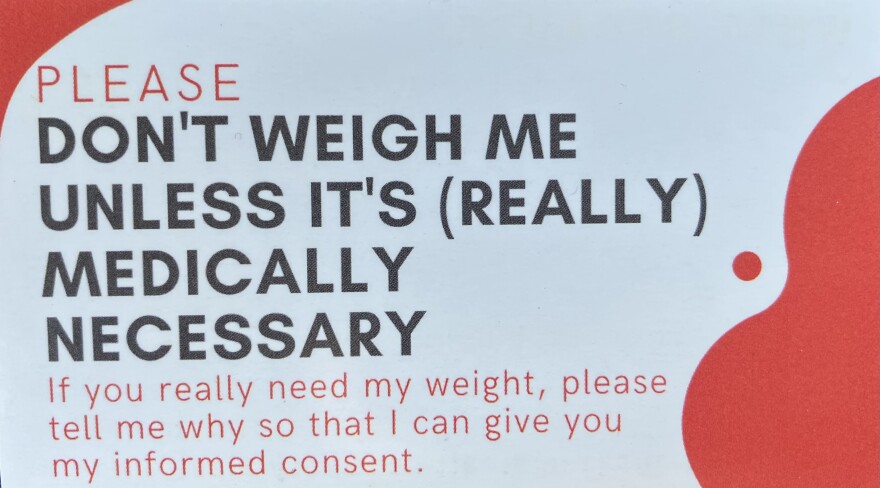During her recovery from an eating disorder, medical appointments became extremely stressful for Ginny Jones.
She said weight stigma and the notion that weight defines a person's health or identity is a main contributor to eating disorders.
Jones began asking nurses if she could avoid having her weight recorded as part of the standard check-in process.
"It was very stressful to ask them not to do something that they're automatically assuming they should do," she said.

So Jones created note cards to help herself - and others - start that conversation. The front of the card reads: "Please Don't Weigh Me Unless it's Medically Necessary". The back of the card explains the reasons why she believes people should be empowered to take this stand.

Jones assumed if she was struggling with this, other people were, too. "And it turns out that yes, they are, because the cards have gone totally viral and they're, like, all over the world," she said.
So far, Jones estimates that she has sent out about 80,000 of the note cards in multiple languages to people throughout the U.S., Canada, Europe, South and Central America, India, and China.
A year or two ago, the cards found their way to the front desk of an employee health clinic at the University of Rochester. Dr. Ralph Manchester, director of University Health Service (UHS), said a member of his staff suggested that they be made available to patients at the clinic. Manchester is all for it.
He wants patients to always feel empowered to assert themselves and ask questions about every aspect of their medical care, including weigh-ins. He said during a typical week, a handful of clinic patients will choose not to get weighed and those wishes are respected.
"We don't have a hard and fast rule about that," Jones said. "We want our patients to feel comfortable. We don't want them to feel that there is one more barrier to getting the care they need."
Jones cites research suggesting that some patients will avoid clinical care if they perceive that their body weight will be a source of embarrassment. This includes one study showing women with a higher body max index were less likely to seek recommended screenings for breast, ovarian, and cervical cancer.
There are, however, instances where health care providers do need to know how much a patient weighs.
For instance, Manchester points out that certain medication doses are based on weight. Also, patients qualify for treatments for some diseases, such as diabetes, based on their BMI.
But to ask a patient to step on a scale every time they visit a medical office? Jones argues that's not strictly necessary and that a person's weight is often not even the best diagnostic tool.
"Starting every appointment with weight is setting the wrong precedent in terms of what is health, what is wellbeing," Jones added, suggesting that medical providers consider, "How do I care for this person in front of me? Not just the body, but the person?"
When she visits a doctor these days, Jones said she simply tells the nurse, in a matter-of-fact tone, "I don't get weighed," and they move on. But people tell her they sometimes still feel pressured to step on the scale, so she continues with her mission to help them.
She stressed that she is not saying people never need to be weighed. "I'm not telling doctors what to do. I'm just advocating for patients to speak up for themselves and ask questions."



